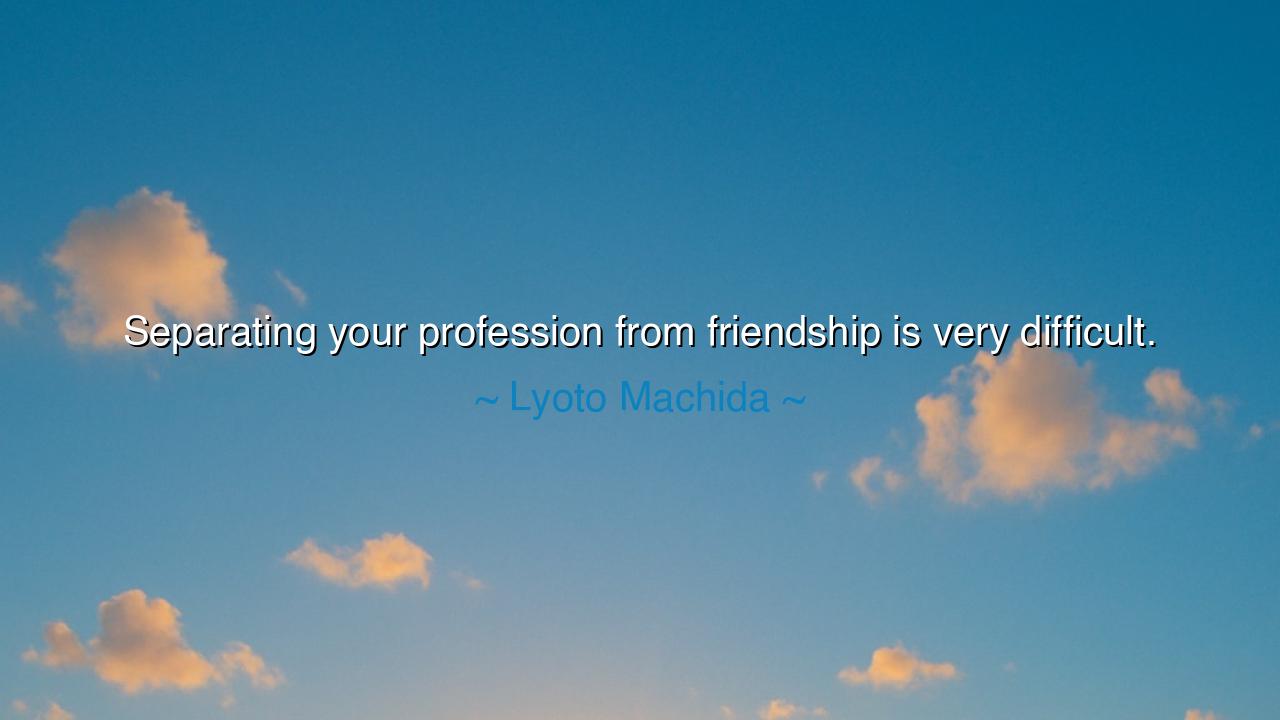
Separating your profession from friendship is very difficult.






In the grand tapestry of life, the struggle to balance the demands of profession with the bonds of friendship is one of the greatest challenges we face as humans. The words of Lyoto Machida, a warrior who has fought in the highest arenas, resonate deeply with this universal truth: "Separating your profession from friendship is very difficult." These words are not merely a reflection on the nature of competition and work, but a profound commentary on the very essence of the human condition. For in the world of warriors, whether on the battlefield or in the arena, the bonds formed with those who fight alongside you are often as deep and complex as any friendship.
Friendship, in its purest form, is built on mutual trust, understanding, and shared experience. Yet, when professions—especially those that demand personal sacrifice and commitment—are involved, the waters of friendship become murky. The ancient Spartans, revered for their courage and unity, lived by the motto "Come back with your shield, or on it." In this brutal code, warriors were bound by the sacred trust they shared with one another. But even in their ranks, where brotherhood was revered, the line between duty and friendship was often blurred. To serve and fight for your city was paramount, but to trust your comrades in battle was equally essential. The battlefield did not separate these two elements; rather, it fused them into a singular purpose. Machida speaks of this very fusion—the difficulty of distinguishing between the demands of one’s craft and the deep loyalty that friendship calls for.
In the same way that Spartans were warriors bound by loyalty, Machida reveals the inherent conflict when professional obligations require you to face those you call friends. Imagine the samurai of old, skilled in the ways of the sword and bushido—the way of the warrior—where every decision could mean life or death. A samurai’s profession was to serve, to protect his lord, but when the call to battle came, often it was not a question of who stood before him but what was at stake. His loyalty to his lord, to his profession, sometimes required him to strike down his brother in arms, creating an inner turmoil that only a few could resolve. In such a life, friendship could never be simply separated from duty. The samurai, like Machida, knew that to separate duty from friendship was not a luxury—it was a great challenge.
Machida’s words also reflect the nature of competition itself. In the world of sports, particularly combat sports, the line between opponent and ally can often become blurred. To compete at the highest level, you must sharpen your skills, often training with those who will later stand against you in the arena. In this, there is both camaraderie and rivalry. Muhammad Ali, one of the greatest fighters to have ever lived, often spoke of the deep respect he held for his opponents, yet he knew, as did Machida, that their profession required them to be not friends, but competitors when the bell rang. The conflict between respect and rivalry is not easily reconciled, and the true warriors understand the sacrifice that comes with this internal struggle.
In ancient Rome, gladiators fought not just for honor or fame, but for survival. Yet, even in the arena where only one could emerge victorious, there was often a bond formed between combatants—a shared understanding that they fought not only for themselves but for each other’s respect. The Colosseum was not only a place of violent contest, but also one of shared brotherhood among those who understood the ultimate sacrifice. They were brothers in arms, even as they stood on opposite sides in the fight for glory. Machida, too, recognizes this paradox—how a fighter’s profession is intertwined with friendship, often leading to a space where loyalties and duties clash.
The lesson here is one of balance and understanding. In all areas of life, we are constantly asked to navigate the thin line between professional ambition and personal connection. Whether in sports, business, or relationships, we will often be called to make difficult decisions that require us to weigh our commitments to others against our individual goals. The key is to recognize that friendship, loyalty, and professionalism need not exist in opposition. Rather, the greatest strength is found in learning to integrate these forces within our hearts and minds.
Thus, as we move forward in our own lives, let us embrace the wisdom of Lyoto Machida and the ancient warriors. Let us understand that the challenge of balancing work and friendship is not just a modern dilemma, but a timeless one. And in facing this challenge, let us strive to be true to both our friends and our calling, knowing that the strength of our bonds and our commitments will determine the true measure of our greatness. Let us not be afraid to face the complexities of this world, but rise to meet them, as those who came before us did—fighting not just for ourselves, but for the greater good of those we hold dear.






AAdministratorAdministrator
Welcome, honored guests. Please leave a comment, we will respond soon